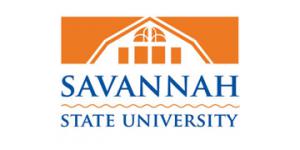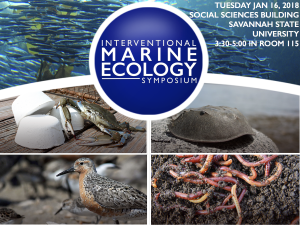Interventional Marine Ecology Symposium at Savannah State University on January 16, 2018
Topics will include:
• A synthetic, sustainable bait using the same naturally occurring molecules found in baitfish – with potential to conserve 18 million tons of wild fish used merely as bait every year – posing urgent threats to human and wildlife food security, the environment, and commercial and recreational fishing industries.
• “Free range” cultivation of Atlantic horseshoe crabs, the sole source of amebocytes, indispensable to human medicine. A patented catheter and scalable “ranching” would advance a rationale to forestall wild capture and help replenish this keystone species.
• An enriched, easily digestible food for migrating shorebirds to alleviate diminishing access to adequate nourishment due to climate change, industrial harvesting of keystone species, habitat destruction and pollution.
• Sustainable, worm-based aquaculture feed fortified to address USDA objectives. At risk of collapse in various regions/species, another 35 million tons of forage fish
are captured annually for farmed-fish feedstock.
A detailed abstract of the content and logistics for the 2018 Interventional Marine Ecology Symposium (IMES) can be found at: www.kepleybiosystems.com/IMES2018.
The symposium has been coordinated by the Savannah State University Department of Marine Biology, welcoming researchers from Kepley BioSystems, Inc. and the Joint School of Nanoscience and Nanoengineering.
Please visit the IMES website (www.kepleybiosystems.com/IMES2018) following the event to view a recording of the symposium.
About Savannah State University
For 128 years, Savannah State University has been an important part of higher education. As the oldest public HBCU in Georgia and the oldest institution of higher learning in the historic city of Savannah, SSU has served this community with distinction while meeting the educational needs of an increasingly diverse student population. The University fosters engaged learning and personal growth in a student-centered environment that celebrates the African American legacy while nurturing a diverse student body. Savannah State University offers graduate and undergraduate studies including nationally accredited programs in the liberal arts, the sciences and the professions.
About the Department of Marine Biology
The mission of the Marine Sciences Program at Savannah State University is to provide research, education, and outreach programs which contribute to a vital, technically qualified, intellectually thoughtful, and ethnically diverse community of individuals capable of creatively solving problems and answering questions related to coastal and ocean ecosystem health, environmental quality, and fisheries sustainability.
About Kepley BioSystems
Kepley BioSystems is a North Carolina biotech founded in 2013 and focused on disruptive innovation and global solutions, including: sustainable, synthetic crustacean and pelagic fish bait; redefining aquaculture feeds; developing enriched feed for migrating shorebirds; ranching horseshoe crabs to sustainably harvest LAL, vital to ensuring the safety of pharmaceuticals and medical devices; bringing laboratory quality to bedside testing; and introducing an autologous therapy for breast cancer as an alternative to chemotherapy. KBI originated at the Joint School of Nanoscience and Nanoengineering (JSNN), North Carolina A&T State University and The University of North Carolina at Greensboro. Now located at the Gateway University Research Park proximal to JSNN, KBI is led by Professor Christopher Kepley and Dr. Anthony Dellinger, working in collaboration with lead inventor Terry E. Brady, located on the Caribbean island of Anguilla, British West Indies.
Anthony Dellinger
Kepley BioSystems Incorporated
336-217-5163
email us here
Legal Disclaimer:
EIN Presswire provides this news content "as is" without warranty of any kind. We do not accept any responsibility or liability for the accuracy, content, images, videos, licenses, completeness, legality, or reliability of the information contained in this article. If you have any complaints or copyright issues related to this article, kindly contact the author above.



